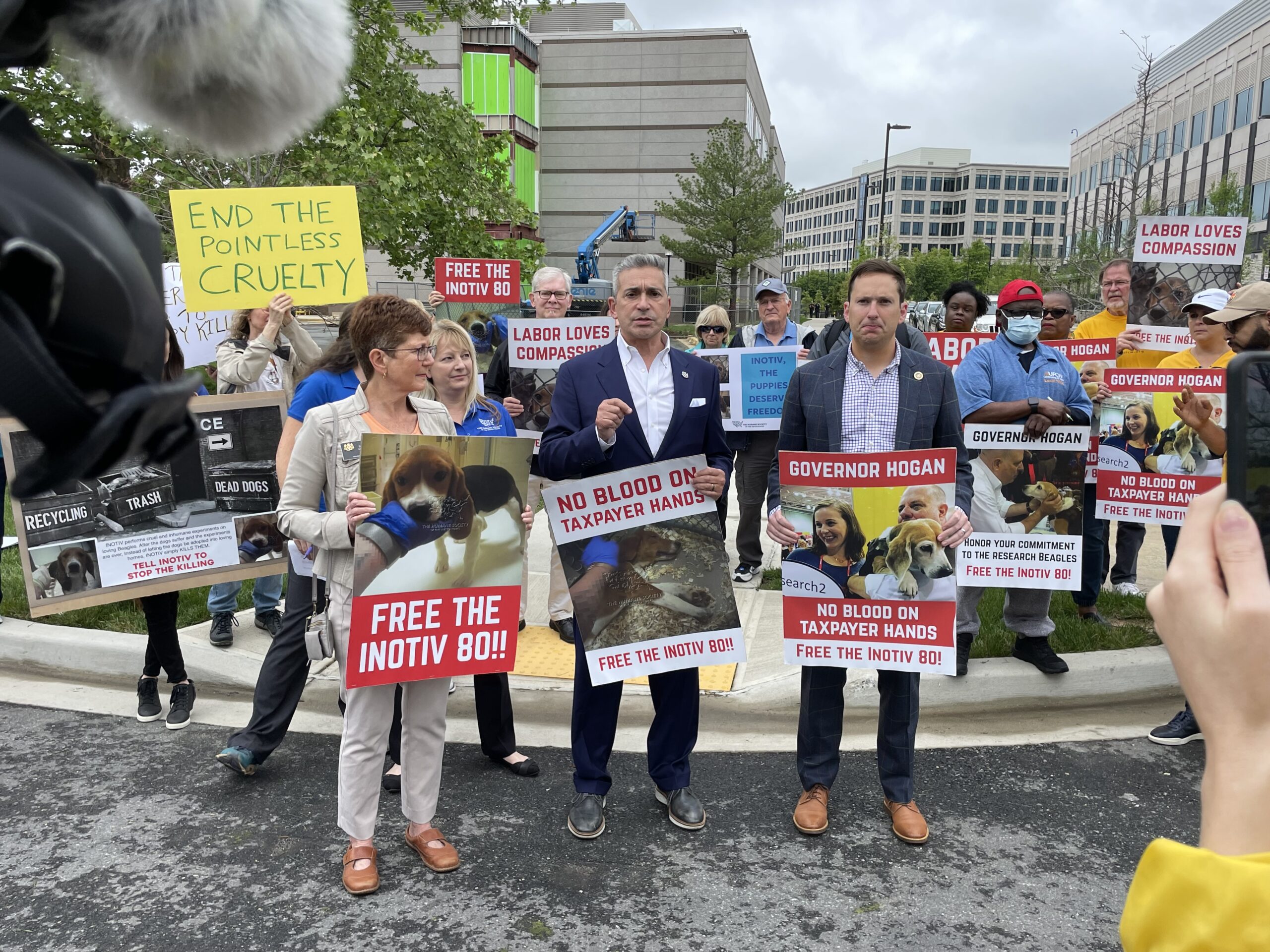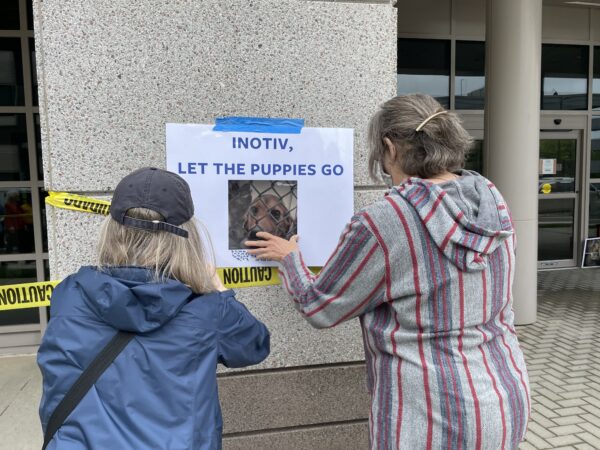Lawmakers Demand End to ‘Barbaric’ Treatment of Animals by Maryland-Bound Firm

Members of the General Assembly, animal rights advocates and labor activists protested on Friday outside a Rockville building that will soon serve as the “East Coast headquarters” for an Indiana-based drug research firm.
Last month, the Humane Society of the United States claimed to have infiltrated a lab run by the firm, Inotiv. It later released a video and a report on what it said was the mistreatment of animals.
“Our investigator witnessed thousands of animals being used in more than 70 studies, many of whom endured prolonged, unalleviated pain and were killed at the end of the study,” the Humane Society said in its report.
Several dozen lawmakers, union members and animal rights activists protested outside of the office building on Medical Center Drive in Rockville that the firm is expected to occupy in the coming weeks. Nearly a dozen uniformed police officers stood watch over the event and protestors were allowed to tape a sign reading “Let the puppies go” to the building.
Protestors demanded that 80 dogs being used in research in Indiana be released for adoption.
“They are refusing to release those beagles when the testing is done,” said Sen. Ben Kramer (D-Montgomery). “Those dogs are scheduled to start being killed en masse this coming Tuesday, and we are demanding that Inotiv free those dogs rather than slaughter them.”
Kramer said that if the dogs have benefited science, “we have an obligation — Inotiv has an obligation — to show them some human kindness” so they can spend their remaining years “in a loving home, knowing a little bit of happiness.”
On its website, Inotiv bills itself as a “laboratory partner in drug discovery and development.” It promises clients “decisive clinical decision support and bioanalytical method validation.”
The company’s site includes a research paper on the “Cardiovascular Effects of Dofetilide in Conscious, Telemetered Beagle Dogs.” Dofetilide (sold under the brand name Tikosyn) is a drug used to treat arrhythmia, an irregular heartbeat.
The company’s website lists no media contact and its phone system hangs up on people who seek to speak with a receptionist.
In an unsigned statement, the company did not address specific allegations contained in the Humane Society report, but it declared that it “complies” with all applicable regulations.
“In the United States, any drug under development must be tested in a controlled environment to properly assess its safety before being tested on humans,” the statement said. “This federally required testing is part of scientific research mandated by government agencies in the United States and around the world.”
Inotiv said its clients develop “life-saving treatments that span a range of human diseases.” The Indiana lab is currently testing a drug that “if successful, will address a specific rare disease affecting newborns, infants and children.”
“This drug must be tested and confirmed to be safe both in toxicity and in dosage before it advances to clinical trials in humans,” the statement said. “Inotiv complies with all applicable federal, state and local regulations, as well as the Animal Welfare Act, and, at our Indiana and Maryland facilities, is accredited by AAALAC, the Association for the Accreditation and Assessment of Laboratory Animal Care International.”
Kramer said he was disturbed to learn that Inotiv is seeking a $372,000 loan from the state Department of Commerce — a loan that could be forgiven if the company meets certain hiring and spending benchmarks. The company has also applied for a $50,000 economic development grant from Montgomery County, records show.
The state loan would only be approved if the county provides matching funds, a spokesman for Gov. Lawrence J. Hogan Jr. (R) said. Commerce “is conferring with the county and seeking more information from the company,” the spokesman added.
In a statement, Montgomery County Executive Marc Elrich (D) said, “I don’t know about this particular research and whether animal testing is the only viable way to test life-saving products.”
“If there are other options, they should not be using animals. And if they are solely dependent on animal testing, then it needs to be as minimal as possible. It cannot be a convenient solution,” he added.

Animal rights protestors tape a sign to a building that will soon serve as the East Coast headquarters for Inotiv, an Indiana-based drug testing company. Photo by Bruce DePuyt.
Dels. Vaughn Stewart and Linda Foley (both D-Montgomery) also attended the protest. They held signs that said “Free the Inotiv 80” and “No blood on taxpayer hands.”
Ray Lee, an organizer for the United Food and Commercial Workers Local 1994, told reporters his union was “outraged” by the Human Society report and video. “This is a sad day,” he said. “I can’t tell you the response that we got from our members when we shared it with them.”
“Taxpayer dollars should not be used to subsidize a company that forces workers to violate the Animal Welfare Act,” he added.
Montgomery County’s top prosecutor, State’s Attorney John McCarthy (D), attended the press conference as an observer but he did not participate.
Afterwards, he told Maryland Matters that — as a six-time cancer survivor — he is grateful for the research that has led to life-saving medications. But he also expressed concern for animals used in testing.
“We’re very actively interested in protecting animals from needless cruelty,” he said. “If there is a quality of life that they can still have, we owe them an opportunity to live out their lives in a loving environment and adopted by families that could love them.”
Kramer said his research determined that Inotiv conducts research on dogs in an unmarked building with mirrored windows in Gaithersburg. He also pointed the media to a report conducted on a Virginia lab by another group, People for the Ethical Treatment of Animals. The lab is owned by Envigo, a wholly-owned subsidiary of Inotiv.
PETA, he said, “found egregious, barbaric treatment of beagles in that facility. And so clearly this is a business model of this company and it happens behind closed doors. Now it has been revealed how they conduct themselves.”
After the USDA cited the firm for mistreating animals and poor conditions at its Cumberland facility, an Envigo spokesman told the Washington Post in December that the company has been working to correct issues raised by the agency. “The highest quality of animal welfare is a core value of our company,” the spokesman said.




 Creative Commons Attribution
Creative Commons Attribution